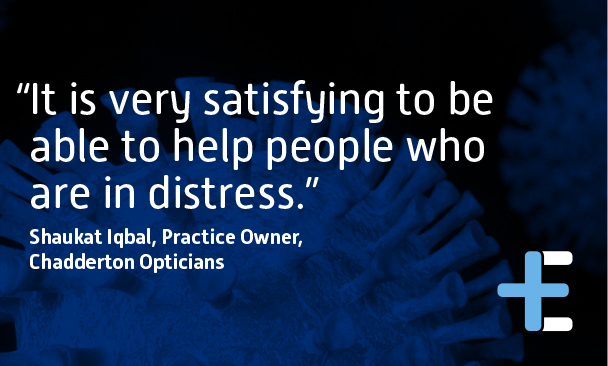Urgent Eyecare Service Hits The Ground Running in Oldham

30 June 2020
When Helen Greenhalgh suffered an eye injury in May, she worried about what to do. With a partner who suffers from asthma and a parent receiving cancer treatment, she didn’t want to expose them to COVID-19 risk. After struggling for a day and night with increasing pain, Helen called 111, who arranged a GP consultation. The GP felt she needed further assessment, but the local hospital was unable to help. Fortunately, Helen lives in Oldham, the first area to benefit from the recently launched COVID-19 Urgent Eyecare Service (CUES), which meant she was able to contact local optical practice Chadderton Opticians to access the urgent eyecare she needed.
CUES was developed by LOCSU, NHSE-I and the Clinical Council for Eye Health Commissioning (CCEHC), endorsed by the College of Optometrists and Royal College of Ophthalmologists. It is a single specification service delivered via primary care optical practices, supported by hospital ophthalmology services, and commissioned locally by CCGs. It offers patients suffering from eye injuries or sudden-onset symptoms access to virtual eye consultations, followed by a care plan that will enable them to either self-manage their condition, have their condition managed by an optical professional including advice and prescribing where necessary, or be referred to the appropriate ophthalmology service if required.
The rationale for the service is to ensure patients can receive urgent eyecare treatment while reducing the risk of COVID-19 infection and relieving pressure on hospitals.
CUES in Oldham is delivered by Primary Eyecare Services, the largest single primary eye care provider in England, acting as the lead contractor for circa 1,300 eyecare practices from small independent practices to large national chains. Chadderton Opticians is one such partner practice, and optometrist Shaukat Iqbal provided Helen’s care.
“I had a virtual consultation with Shaukat via a Whatsapp videocall,” explains Helen. “He looked closely at my eye and took a picture so he could examine it, as well as asking me to describe the pain and what had happened to cause the injury.”
Helen had suffered a foreign body injury to her cornea that was causing a great deal of discomfort.
Following the examination, Shaukat advised Helen to keep the eye closed and apply antibiotic cream to guard against infection. He also advised the use of lubricant drops overnight and artificial tears to keep Helen’s eye moist, as she suffers from dry eyes and this could delay healing. Following the video consultation, Shaukat also sent Helen a text message summarising what she needed to do so she had a written record. “The text message was very helpful as I could read it to the pharmacist, so they knew exactly what I needed,” says Helen.
Overall, Helen was grateful to be able to access help through CUES during lockdown: “I was relieved that I could be treated by an expert without having to go to hospital. Shaukat followed up with me a few days later to check on how I was doing, which I really appreciated.”
From Shaukat’s perspective, delivering CUES during these difficult times is proving very rewarding. He is receiving an average of four calls from patients per day and estimates that, while 60% are from patients registered with the practice, 40% are new referrals from GPs or hospitals. “It is very satisfying to be able to help people who are in distress – it feels as though we are exercising our expertise and giving something back to the profession.”
Since the launch of the service in Oldham, Primary Eyecare Services has also been commissioned to deliver CUES to patients in Many other areas of England.
Wendy Craven, Clinical Governance and Performance Lead at Primary Eyecare Services, was closely involved in establishing CUES in Oldham. She explains how it was possible to get the service in place so quickly: “We were in the process of negotiating the provision of other commissioned eye pathways for Oldham, when COVID-19 struck. The relationships we had worked to build over a long time really came into their own and we were able to turn round the whole agreement in around six weeks, from first starting to talk to the CCG about it to the point where practices were registered to see patients. The link-up between Greater Manchester East LOC, the Chair of the Local Eye Health Network and the commissioner was invaluable. Also, there was strong support for the service from the Pennine Acute Hospital Trust. Everyone was keen to see the service in place and worked hard to make it happen.”
Dharmesh Patel, CEO of Primary Eyecare Services, is proud of how CUES has been developed and rolled out, saying: “Our partner practices have really risen to the challenge to deliver this service in close cooperation with colleagues in secondary care setting. It means patients like Helen can receive appropriate care while minimising the risk of COVID-19 to themselves and their families and reducing pressure on wider NHS services.”